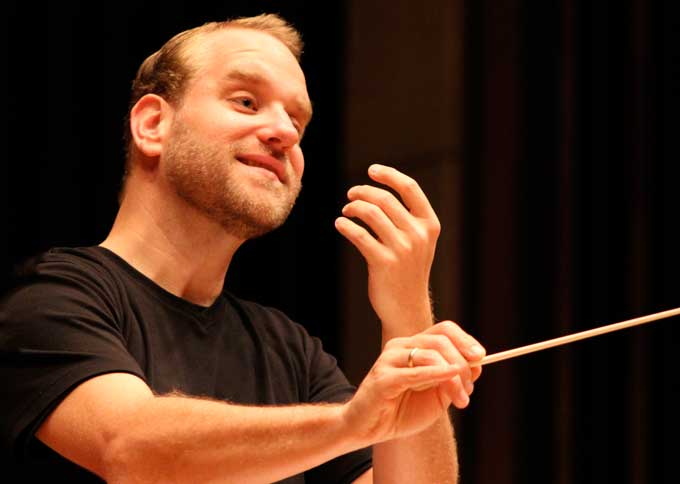Stefan Sanders Takes the BPO to Mexico
by Jan Jezioro

Celebrating Aaron Copland and Mexican composer Silvestre Revueltas
The Buffalo Philharmonic Orchestra is on something of a musical travel kick. Music director JoAnn Falletta led the BPO in very well-received concerts the last two weekends that celebrated the music of Finnish composers. This Friday at 7pm, associate conductor Stefan Sanders will be on the podium in Kleinhans as the BPO explores the music of Aaron Copland and Mexican composer Silvestre Revueltas in this season’s first “Know the Score” concert. Sanders has already demonstrated an affinity with the music of Copland, having made his first appearance as a BPO guest conductor in 2014 in another KTS program entitled “Copland’s America.”
For this multi-media event, Sanders will be collaborating with writer and producer Joseph Horowitz and visual artist Peter Bogdanoff, who have previously offered similar BPO programs about Dvorak and Ives. “This will be the first time I’ve worked with Joseph Horowitz,” says Sanders. “He is a brilliant scholar, writer, and musician, and his passion for the story behind the music has produced several of these ‘informance’ style programs like “Copland in Mexico.” WNED program personality Peter Hall will be the host for the program, which explores the ways in which Mexican music influenced Copland, and how in turn Copland and his music influenced the music of Silvestre Revueltas.
Copland first visited Mexico City in 1932 and his friend the Mexican composer Carlos Chávez took him to a nightclub called “El Salón México.” Inspired by this visit he composed his piece of the same name. “I was attracted by the spirit of the place and by the Mexican people” Copland wrote. “My purpose was not merely to quote literally, but to heighten without in any way falsifying the natural simplicity of Mexican tunes. Never in my wildest dreams did I expect this kind of acceptance for the piece!” Sanders says “It was the first populist work that fused Copland’s own mix of modernist rhythmic ingenuity, his signature expansive orchestral palette, and Mexican folk music into a piece that was an instant hit and has remained popular ever since.”
One of the Mexican composers most influenced by Copland’s use of folk and popular Mexican themes in El Salón México was the sadly short-lived Silvestre Revueltas (1899-1940). Revueltas began as a violinist who studied first in Mexico and then in Chicago. He conducted in this country before being asked by Chávez in 1929 to be his assistant conductor at the National Symphony in Mexico City. Revueltas developed his own unique symphonic composing style, utilizing shorter forms, while avoiding that of the symphony and the concerto.
The composer’s best known work in America is Sensemayá, which was a hit when recorded by Stokowski in 1947. “I have not conducted Sensemayá before”, says Sanders, “but I am intoxicated by it at the moment and can’t wait to perform it this Friday. It is a remarkable piece of music that is so maniacal, relentless even, and infectious. It is also a very challenging work to put together, as is Revueltas’ Homenaje a Federico Garcia Lorca.” Revueltas, a staunch supporter of the Spanish Republic, wrote the work as a memorial to the great poet who was assassinated in 1936 by Franco’s fascists during the Spanish Civil War. “The last movement of the Homenaje, ‘Son’, is rather difficult. In both pieces, Revueltas writes very tricky rhythms that most orchestras do not see on a regular basis. But all of the work required to successfully perform these pieces has a great reward, because it is absolutely brilliant music. Revueltas loves to write for brass and percussion, and in both of these pieces, the ‘back’ of the orchestra gets a real workout.”
The second half of the program will feature a screening of the 60 minute film Redes (“Nets”), with the BPO musicians playing Revueltas’ original orchestral score. The American Paul Strand, who Susan Sontag called “the biggest, widest, most commanding talent in the history of American photography” was invited by Chávez in 1933 to be the cinematographer for Redes, a semi-documentary film of poor fishermen victimized by monopoly control of their market. Fred Zinnemann, a recent Austrian émigré to America, who later went on to a major career in Hollywood, was a co-director of this starkly dramatic film that turns the struggle of the fishermen, who are mostly played by non-professionals, against their oppressors into a human drama of epic proportions. There are long sections without any dialogue in the often metaphorical imagery of the film and it during these stretches that the score that Revueltas composed is most powerful.
Reflecting on his second season as BPO associate conductor, Sanders says: “This job gives me the opportunity to make music with world class musicians on a very regular basis. From these experiences I am able to learn and grow as a conductor, and that is what it’s all about. I am also very blessed to work with such a dedicated staff and administration as well. What makes the BPO and Buffalo great are the people, and the people here are exceptional.”
Information: 885-5000 or www.bpo.org.
French Music and Poetry at Pausa
The Pausa Art House at 19 Wadsworth Street in Allentown continues to be the most eclectic musical arts venue in Buffalo. On Thursday October 22 at 8pm, the New York Philharmonic staff pianist Eric Huebner, whose performances are not to be missed, will be joined by guitarist Bernard Kunz for an event being billed as “Soirée Poésie-Musique,” or, an evening of French poetry and music.
Tickets: $5. Information: www.pausaarthouse.com.
blog comments powered by Disqus|
Issue Navigation> Issue Index > v14n41 (Week of Thursday, October 15) > Stefan Sanders Takes the BPO to Mexico This Week's Issue • Artvoice Daily • Artvoice TV • Events Calendar • Classifieds |









 Current Issue
Current Issue